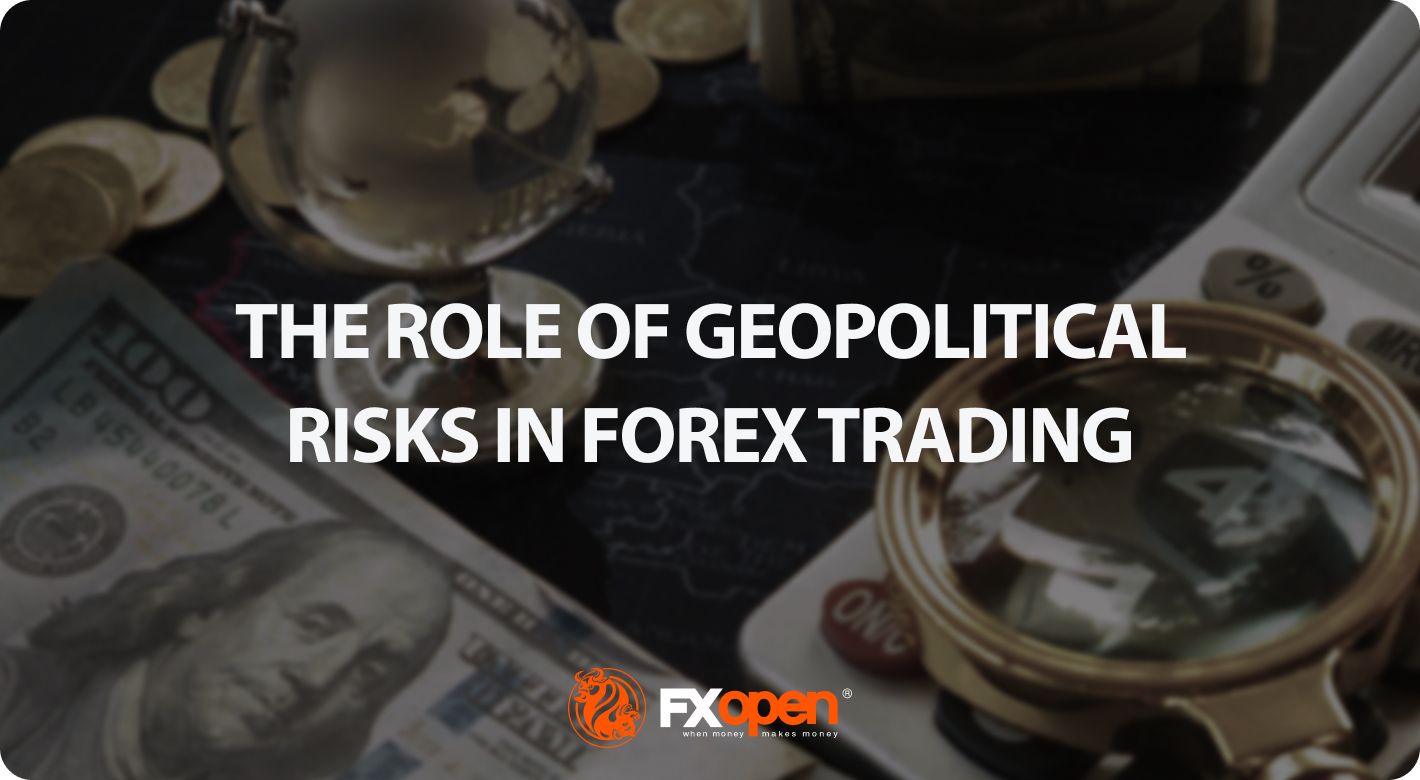FXOpen

In the complex world of forex trading, a myriad of factors contribute to the ever-shifting landscape of exchange rates. Among these, geopolitical risks stand out as potent catalysts capable of triggering significant fluctuations in currency values. This article delves into the intricate relationship between geopolitical events and forex markets, exploring how political instability, conflicts, and trade disputes can impact exchange rates.
What Are Geopolitical Risks?
Geopolitical risks encompass a broad spectrum of factors that have the potential to disrupt the global economic order. From political instability and armed conflicts to trade disputes and diplomatic tensions, these risks can send shockwaves through financial markets. Traders navigating the forex landscape must grapple with the uncertainty emanating from geopolitical hotspots worldwide, which means understanding profoundly how geopolitical risks impact forex markets.
Geopolitical Impact on Forex
The primary conduit through which geopolitical events influence currency fluctuations is the introduction of uncertainty. This uncertainty, in turn, triggers a surge in market volatility. Effective forex trading with geopolitical risks means not only reacting to these events but also anticipating and positioning strategically, leveraging the volatility to a competitive advantage.
Reactions of Different Currencies to Geopolitical Events
Various types of geopolitical events affect forex currencies differently.
- Currencies of nations heavily reliant on commodity exports, such as the Australian dollar and the Canadian dollar, can be particularly sensitive to disruptions in global trade or commodity markets as such events may lead to supply chain issues and, respectively, to currency depreciation.
- Emerging market currencies often exhibit heightened sensitivity to geopolitical events because traders view these currencies as riskier assets and respond to geopolitical uncertainties by divesting from them. Consequently, geopolitical tensions may lead to depreciations in the currencies of emerging markets.
- Currencies within the Eurozone are influenced not only by global geopolitical events but also by dynamics within the European Union (EU). Political developments affecting EU member countries may impact the euro, requiring traders to consider both global and regional factors when assessing potential currency movements.
You can visit FXOpen and try trading the forex markets on our free TickTrader trading platform.
Safe-Haven Currencies and Geopolitical Uncertainty
In the turbulent waters of geopolitical uncertainty, certain currencies emerge as beacons of stability and safety. These so-called safe-haven currencies play a crucial role as investors restructure their portfolios.
- The US dollar, often considered to be the quintessential safe-haven currency, tends to strengthen during periods of heightened geopolitical uncertainty. The global economic influence of the United States, coupled with the widespread use of the US dollar in international trade and finance, positions it as a go-to currency for investors seeking stability.
- The Japanese yen is another currency that historically attracts investors during geopolitical turmoil. Japan's reputation for economic stability and the predictable monetary policy of its central bank, coupled with its current account surplus, makes the yen an appealing asset.
- The Swiss franc also stands for financial stability and neutrality. Switzerland's commitment to maintaining a stable and resilient financial system positions the franc as an attractive choice for investors seeking shelter during geopolitical storms. The Swiss franc typically experiences appreciation when global uncertainty rises.
Market Sentiment Impact
How geopolitical risks affect forex also has a lot to do with the way market sentiment and risk appetite play out in the aftermath of major geopolitical news. For example, the resolution of a trade dispute or political stability in a previously uncertain region may make traders more optimistic. This optimistic outlook translates into increased confidence in riskier assets. This renewed risk appetite often leads to a surge in demand for higher-yielding currencies, such as emerging market currencies or those linked to commodities. As a result, these higher-yielding currencies may appreciate. Conversely, negative geopolitical news has the opposite effect, triggering a flight to safety among investors.
Historical Examples of the Relation Between Geopolitical Events and Forex Markets
Let’s examine several historical examples of major currencies being affected by geopolitical events and decisions.
Brexit: The Unravelling of the European Union
The United Kingdom's decision to exit the European Union, commonly known as Brexit, unleashed a wave of uncertainty about the British pound (GBP). In the lead-up to the referendum and its aftermath, the GBP/USD currency pair witnessed significant swings, dropping sharply on the day on which it became clear that the majority of Britains opted to leave the European Union. The uncertainty surrounding the terms of the exit and the potential economic consequences for the UK led to a depreciation of the British pound.
US-China Trade Tensions: A Global Economic Flashpoint
The protracted trade tensions between the United States and China, characterised by ongoing negotiations, tariff changes, and trade restrictions, had a profound impact on forex markets. The Chinese yuan bore a direct impact, particularly during the period from mid-2018 to early 2020. During this timeframe, the trade tensions between the United States and China escalated significantly, marked by the imposition of tariffs and retaliatory measures, leading to the depreciation of the USD/CNH pair, as seen on the chart.
Middle East Conflicts: Geopolitical Turmoil and Regional Currencies
Geopolitical conflicts in the Middle East have historically contributed to volatility in regional currencies. One illustrative example is the Syrian Civil War (the Syrian conflict) and its devastating impact on the Turkish lira (TRY). The uncertainties arising from the conflict, coupled with the influx of refugees and economic challenges in the region, contributed to considerable fluctuations, while the intense phases of the Syrian conflict in 2015 initiated an ongoing depreciation for TRY against the US dollar.
Conclusion
Geopolitical risks are inherent in the modern world, and their influence on financial markets is undeniable; therefore, traders need to stay aware of the potential impact of these significant events and learn how to trade with geopolitical risks. Already have a promising trading strategy? You can open an FXOpen account and try out new trading possibilities.
This article represents the opinion of the Companies operating under the FXOpen brand only. It is not to be construed as an offer, solicitation, or recommendation with respect to products and services provided by the Companies operating under the FXOpen brand, nor is it to be considered financial advice.
Stay ahead of the market!
Subscribe now to our mailing list and receive the latest market news and insights delivered directly to your inbox.








